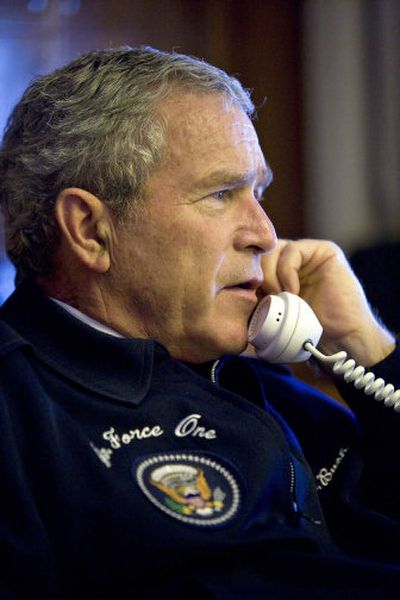Bush splits with other leaders on Mideast crisis

ST. PETERSBURG, Russia – President Bush split sharply from other world leaders Friday in his approach to the deepening crisis in the Middle East as he declined a request from Lebanon’s prime minister to urge Israel to halt its attacks.
While Israeli warplanes struck deeper into Lebanon, Bush talked by phone with Middle Eastern leaders but refused to pressure his Israeli allies to halt their attacks, as Lebanese Prime Minister Fouad Siniora asked during a phone call from Bush.
Israel’s bombardment of Lebanon has been denounced by a host of nations. Spain, Norway, France, Russia, China and others criticized Israel and also called for a cease-fire. The Vatican said it “deplores the attack on Lebanon.”
The differing approaches threatened to divide a summit of the Group of 8 leading industrial nations in Russia at a time when the Bush administration has been hoping the world leaders would come together to form a common front against the Iranian nuclear program.
Leaders are expected to spend time this weekend in St. Petersburg discussing the violence that erupted Wednesday and trying to fashion a joint statement that would lay out a common approach, U.S. aides said.
Bush’s phone call to Siniora in the midst of spiraling tension in Middle East led to confusion over what the two leaders said to one another.
In a statement about the conversation from Siniora’s office, the Lebanese leader said Bush promised to urge Israel “to limit damage to Lebanon … and to spare civilians and innocent people from harm.”
But Bush aides said the president declined to urge a halt to Israeli attacks because he believes the government of Prime Minister Ehud Olmert is entitled to defend itself in a crisis that was begun by Hezbollah militants who staged a cross-border raid into Israel from southern Lebanon to capture two soldiers.
Bush “believes the Israelis have the right to protect themselves, and that in doing so they should limit as much as possible so-called collateral damage, not only to facilities but also to human lives,” Tony Snow, the White House press secretary, told reporters in Russia.
By the end of the day, the administration decided to place additional weight on its message of restraint to Israel.
“It is extremely important that Israel exercise her restraint in its activities of self-defense,” U.S. Secretary of State Condoleezza Rice said in a late-night visit to reporters with Stephen Hadley, the White House national security adviser.
At the same time, Snow emphasized, “the president is not going to make military decisions for Israel.”
In contrast, French President Jacques Chirac condemned the Israeli offensive as “totally disproportionate,” and said it appeared Israel “wished to destroy Lebanon.”
The European Union condemned the Israeli actions on Thursday.
Russian President Vladimir V. Putin said “all sides should immediately end their military actions” as a “starting point for resolving all other problems” according to the Russian news agency Interfax.